Webinar Series
The College of Engineering and Applied Science began hosting webinars in early 2020 with the goal of providing online learning across various topics. These webinars feature faculty experts whose research is shaping the future of the world we live in, along with accomplished alumni who are leaders in their respective industries.
In addition to the live webinars, recordings of past sessions are available to access anytime. Contact the alumni engagement team at engalumni@colorado.edu if you have ideas for future webinars or if you are interested in presenting.
Upcoming Webinars
Check back soon for our spring 2021 webinar schedule!
More CU Engineering alumni events can be found on the College of Engineering Alumni Engagement Calendar.
View Past Webinars
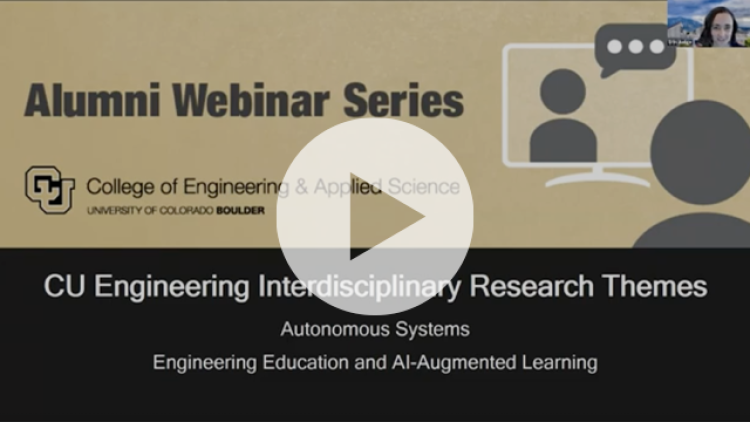
December 2020
In 2018, the College of Engineering & Applied Science faculty defined six unique Interdisciplinary Research Themes that built off our strengths, aligned with future opportunities, and could provide transformational societal impact. In this webinar, hear from Massimo Ruzzene, associate dean for research, and two of the IRT directors about the exciting work being done in the following Interdisciplinary Research Themes.

November 2020
Associate Professor Wil Srubar shares the recent success of highly interdisciplinary researchers in biochemistry, microbiology, materials science and structural engineering in applying synthetic biology toolkits to engineer bacteria to create useful minerals and polymers and form them into living building blocks that could, one day, bring buildings to life.

October 2020
Scott Flaska (MechEngr'14), senior manager of football analytics with the Denver Broncos, discusses his career path since graduating from CU Boulder and how he landed in the world of football technology and research. Scott shares a glimpse into how data are used to do player evaluations and projections, all without giving away any top-secret Bronco information.

October 2020
Ben Linville-Engler (MechEngr’07), now at MIT, shares how local and regional manufacturing ecosystems can be leveraged during a crisis. As part of the Baker-Polito Administration’s response to the COVID-19 pandemic, the Massachusetts Manufacturing Emergency Response Team (MA M-ERT) was established to mobilize, organize, and operationalize critical path work streams necessary for Massachusetts manufacturers to pivot their operations to produce needed FDA compliant medical devices and supplies at scale.
October 2020
ATLAS is an Institute for Radical Creativity and Invention. With academic programs in the College of Engineering and Applied Science, and faculty and student engagement campus-wide, ATLAS is a community of technology visionaries and virtuosos. In this webinar, ATLAS faculty will share an exciting preview of the future, with talks on augmented reality and shape-changing displays, smart textiles, and computational design and creativity. Faculty presenters include Laura Devendorf (assistant professor, Unstable Design Lab), Daniel Leithinger (assistant professor, THING Lab), Ellen Yi-Luen Do (professor, ACME Lab).
October 2020
Calling all future engineers! This overview of the new, online K-12 engineering modules features an introduction to Tinkercad's 3D Design & Arduino circuit simulator, Onshape CAD, and Coding developed by the Integrated Teaching and Learning Program Pre-College team at the College of Engineering & Applied Science.

September 2020
Daniel Larremore, an assistant professor in the Department of Computer Science and the BioFrontiers Institute, discussed that even though many SARS-CoV-2 (COVID-19) infections produce no symptoms or mild symptoms, they are still capable of passing the virus to their contacts. Surveillance testing is an umbrella term describing the ways in which we might use widespread testing—of people with and without symptoms—to catch silent cases and suppress the ongoing epidemic. In this webinar, Larremore showcased his research on the effectiveness of broad, frequent, rapid testing in settings like workplaces, campuses, and even cities.
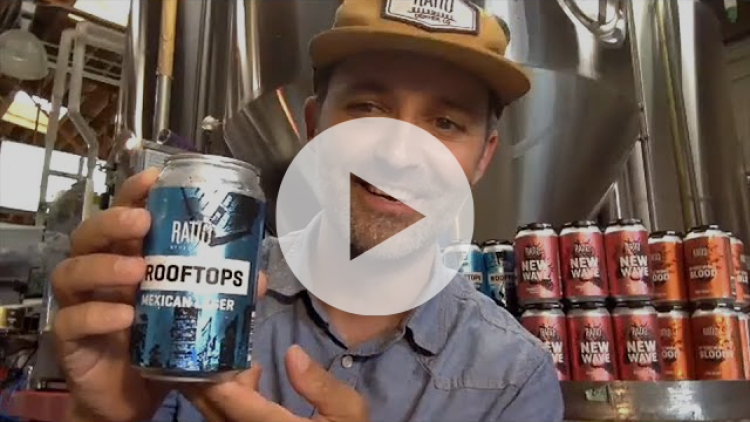
July 2020
Jason zumBrunnen (ChemEngr'97), owner of Ratio Beerworks, discussed the journey into the craft beer world, how engineering has helped him make improvements to the brewery and talked about a few of his favorite beers. He also did a demonstration with their newly purchased canning machine.

July 2020
The entire family will be able to follow along in this fun, hands-on webinar where you'll learn how to create your own 3D design keychain plus a creation of your choice. These designs can be saved as STL files to 3D print later. This event was hosted by the college’s Integrated Teaching and Learning Program.
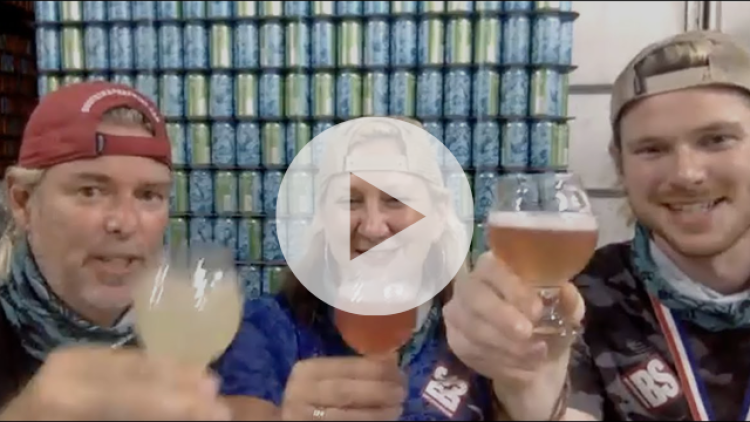
June 2020
Steve Kaczeus (MechEngr'82), owner of Bootstrap Brewing Company in Colorado, and his family discussed their journey into the craft beer world, how they are using engineering concepts to make improvements to their process, and their transition into producing hard seltzers. They also gave an inside look at their brewery, and of course, tasted a few of their beers and seltzers.

May 2020
Kyri Baker, an assistant professor in the Department of Civil, Environmental and Architectural Engineering, discussed how increased residential electricity consumption and decreased commercial electricity consumption due to stay-at-home orders and social distancing are dramatically changing the way the grid operates. Not only do weekdays now appear as weekends to the grid, but changes in demand patterns are changing which power plants are generating electricity, how much renewable energy is being utilized within the grid, and more. In this talk, we will discuss how COVID-19 is affecting the electric power grid, from exploring the impacts within neighborhoods all the way up to electricity markets.
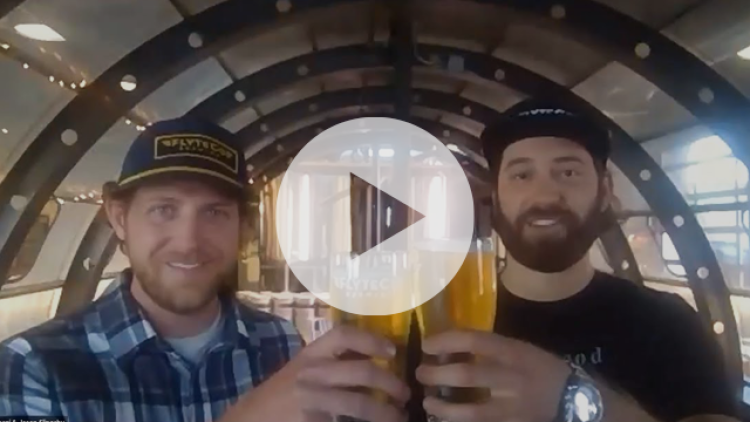
May 2020
Engineering alumni Eric Serani (AeroEngr'11; MS'11) and Jason Slingsby (ChemEngr'11), owners of FlyteCo Brewing along with aerospace Instructor Bobby Hodgkinson (AeroEngr'11; MS'11) discussed the journey into the craft beer world, gave an inside look at their Denver brewery and taproom (spoiler: it has a lounge assembled from a mock airplane fuselage!), and of course, tasted a few of their beers.
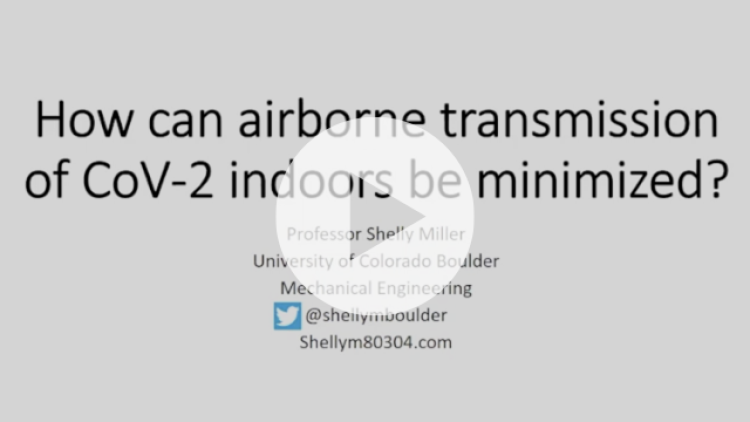
May 2020
Shelly Miller, professor in the Paul M. Rady Department of Mechanical Engineering and the Environmental Engineering Program, summarized some of the recent scientific information that has been accumulating to support that COVID-19 transmission occurs via the airborne exposure route; crowded, poorly ventilated environments are particularly at risk. Miller also discussed what can be done in buildings during pandemics to minimize airborne transmission risk.



